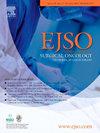Significance of anatomical resection and wide surgical margin for HCC patients with MVI undergoing laparoscopic hepatectomy: A multicenter study
IF 3.5
2区 医学
Q2 ONCOLOGY
引用次数: 0
Abstract
Objective
To investigate the impact of surgical resection margin and hepatic resection type on prognosis and compare their prognostic significance on patients with hepatocellular carcinoma (HCC) with or without microvascular invasion (MVI) who underwent laparoscopic liver resection (LLR).
Methods
A retrospective analysis was conducted on 320 patients with HCC who underwent LLR. According to the grading of MVI, patients were classified as M0, M1 and M2. Patients were divided into the anatomical resection (AR) and nonanatomical resection (NAR) groups according to the hepatic resection type. Survival and Cox regression analyses were performed to explore the effects of AR and NAR, wide and narrow resection margin on overall survival (OS) and time to recurrence (TTR).
Results
In the whole cohort, narrow resection margin was an independent risk factor for OS and TTR, whereas NAR was not. Subgroup analysis showed that narrow resection margin and NAR were both independent risk factors for OS and TTR in HCC patients with MVI. The 5-year OS and TTR rates of the two groups (NAR-wide resection margin and AR-narrow resection margin) with M1 were 85.3 % versus 62 % and 34.4 % versus 60.2 %. Similarly, the 5-year OS and TTR rates of the two groups (NAR-wide resection margin and AR-narrow resection margin) with M2 were 80.2 % versus 47.9 % and 30.8 % versus 64.8 %.
Conclusions
Anatomical hepatectomy and wide resection margin were independent protective factors for HCC patients with MVI receiving LLR. Nonetheless, wide resection margin had a greater impact on prognosis than anatomical hepatectomy.
接受腹腔镜肝切除术的MVI HCC患者解剖学切除和宽手术切缘的意义:一项多中心研究。
目的研究手术切除边缘和肝切除类型对预后的影响,并比较它们对接受腹腔镜肝切除术(LLR)的有或无微血管侵犯(MVI)的肝细胞癌(HCC)患者的预后意义:对320名接受腹腔镜肝切除术的HCC患者进行了回顾性分析。根据 MVI 的分级,患者被分为 M0、M1 和 M2。根据肝切除类型将患者分为解剖性切除(AR)组和非解剖性切除(NAR)组。研究人员进行了生存和Cox回归分析,以探讨AR和NAR、宽切除边缘和窄切除边缘对总生存期(OS)和复发时间(TTR)的影响:结果:在整个队列中,窄切除缘是OS和TTR的独立危险因素,而NAR不是。亚组分析显示,切除边缘窄和NAR都是MVI HCC患者OS和TTR的独立危险因素。两组(NAR-宽切除边缘和AR-窄切除边缘)M1患者的5年OS和TTR率分别为85.3%对62%和34.4%对60.2%。同样,两组(NAR-宽切除边缘和AR-窄切除边缘)M2患者的5年OS和TTR率分别为80.2%对47.9%和30.8%对64.8%:解剖性肝切除术和宽切除边缘是MVI HCC患者接受LLR的独立保护因素。然而,与解剖性肝切除术相比,宽切除边缘对预后的影响更大。
本文章由计算机程序翻译,如有差异,请以英文原文为准。
求助全文
约1分钟内获得全文
求助全文
来源期刊

Ejso
医学-外科
CiteScore
6.40
自引率
2.60%
发文量
1148
审稿时长
41 days
期刊介绍:
JSO - European Journal of Surgical Oncology ("the Journal of Cancer Surgery") is the Official Journal of the European Society of Surgical Oncology and BASO ~ the Association for Cancer Surgery.
The EJSO aims to advance surgical oncology research and practice through the publication of original research articles, review articles, editorials, debates and correspondence.
 求助内容:
求助内容: 应助结果提醒方式:
应助结果提醒方式:


